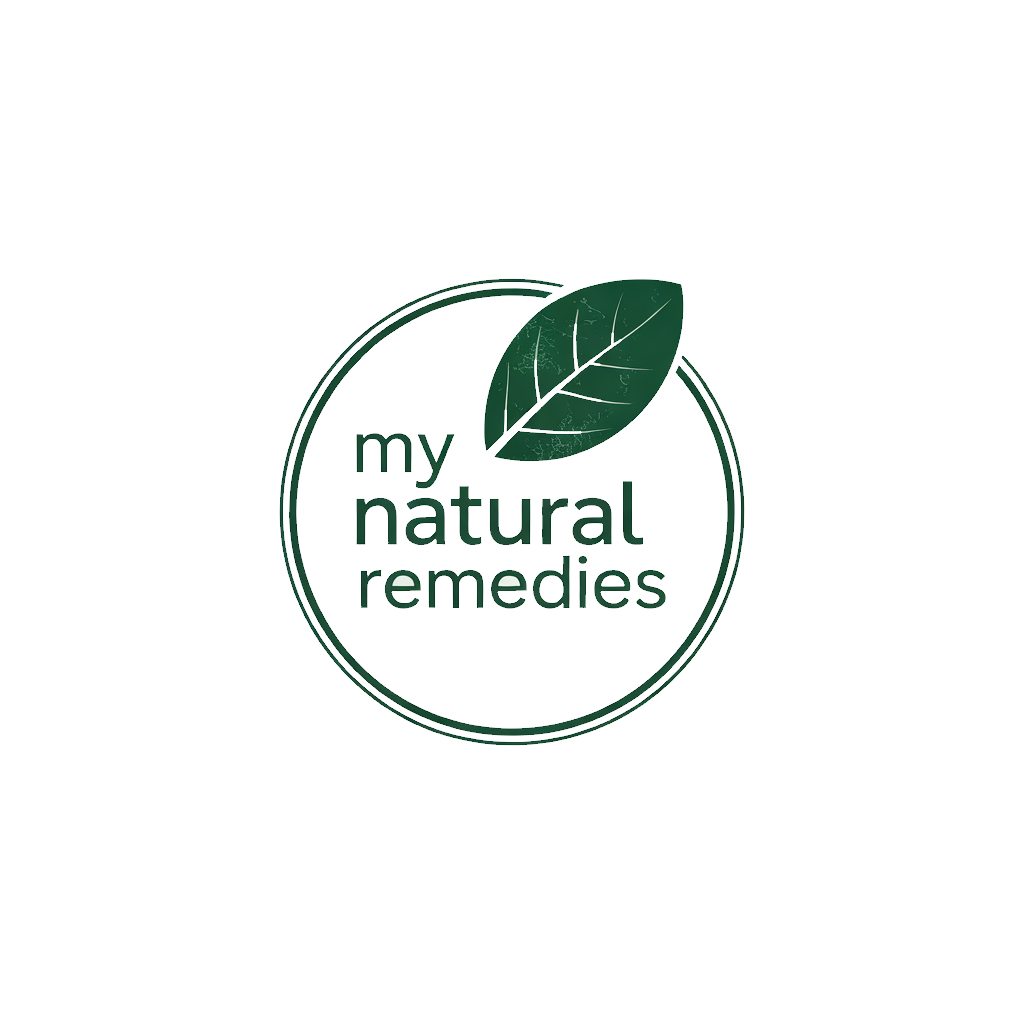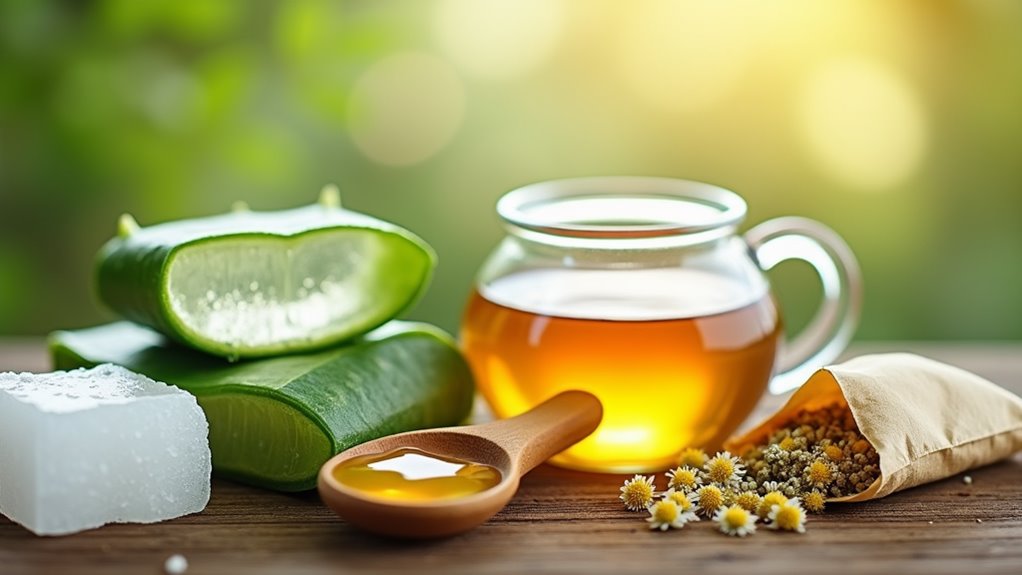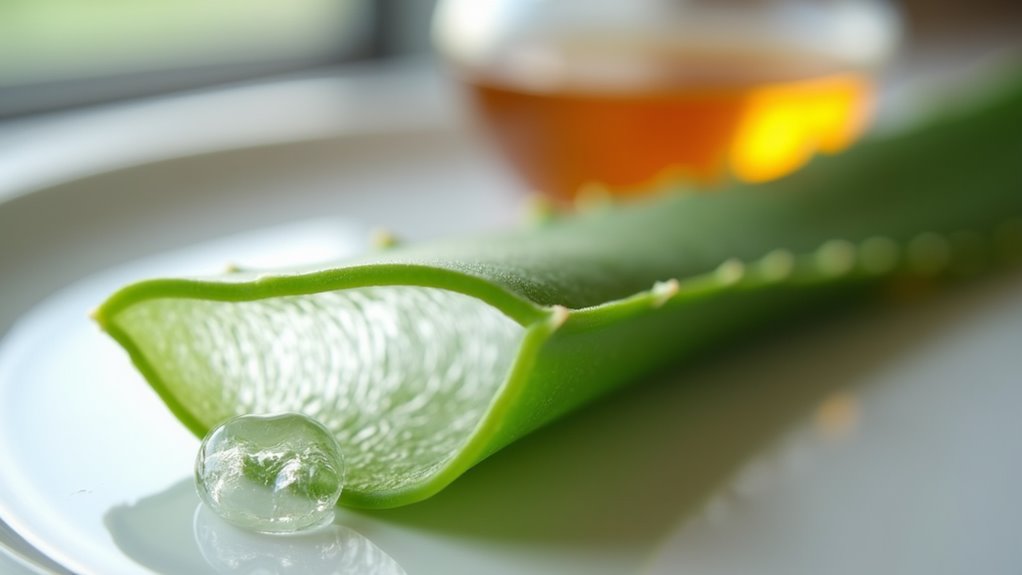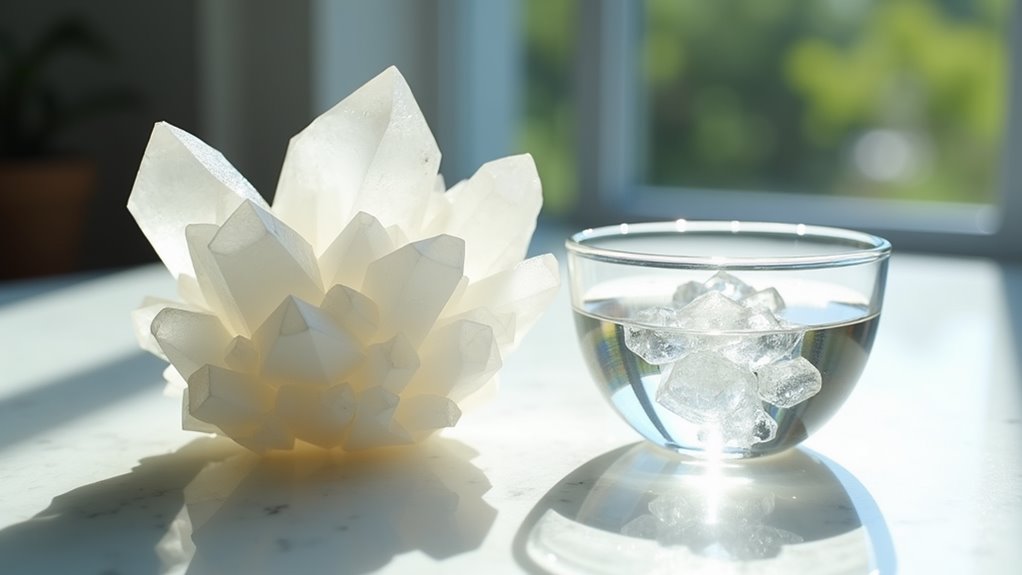Canker Sore Solutions- 4 Natural Remedies for Fast Healing!
You’ll find quick relief from painful canker sores with these proven natural remedies. Try gargling with warm salt water 3-4 times daily, or apply raw honey directly to the affected area. Pure aloe vera gel can speed healing by up to 40%, while chamomile tea’s anti-inflammatory properties provide soothing comfort when used as a mouth rinse or compress. These simple home treatments offer powerful healing benefits when used consistently.
Understanding Canker Sores and Their Causes
Although canker sores might seem like a minor nuisance, these small ulcers that develop inside your mouth can cause significant discomfort.
You’ll typically notice them appearing on your inner cheeks, tongue, or the soft areas of your mouth, making everyday activities like eating and talking painful.
If you’re dealing with canker sores, you’re not alone. These common mouth ulcers affect about 20% of people regularly.
While the exact cause isn’t always clear, several factors can trigger their development, including stress, food allergies, vitamin deficiencies, or minor injuries to your mouth.
Sometimes they appear when you’re run down or your immune system is compromised. Nutritional deficiencies may contribute significantly to these painful sores.
Before trying various canker sore remedies, it’s helpful to identify what triggers your outbreaks.
Keep track of when they occur and what you’ve eaten or experienced recently.
This knowledge can help you prevent future episodes and choose the most effective treatment approach.
Salt Water and Honey: Time-Tested Natural Solutions
When it comes to treating canker sores naturally, both salt water and honey have stood the test of time as effective remedies.
You’ll find that gargling with warm salt water 3-4 times daily can significantly reduce pain and speed up healing. Simply mix half a teaspoon of salt in a cup of warm water, swish it around your mouth for 30 seconds, and spit it out.
Honey’s natural antibacterial properties make it another powerful ally in your healing journey. You’re not alone if you’ve heard your grandmother recommend this sweet solution – it’s been used for centuries!
Simply apply a small amount of raw honey directly to your canker sore using a clean cotton swab. Let it sit for a few minutes before rinsing. You’ll notice the pain subsiding almost immediately, and the sore will likely heal faster.
For best results, apply honey 2-3 times daily, especially before bedtime. Additionally, consider dietary adjustments to help support the healing process and reduce inflammation.
The Healing Powers of Aloe Vera for Mouth Ulcers
Since ancient times, aloe vera has proven itself as a remarkable natural remedy for canker sores. You’ll find this healing plant contains powerful anti-inflammatory and antibacterial properties that can significantly reduce pain and speed up recovery time.
Like many others who’ve discovered this natural solution, you can easily apply pure aloe vera gel directly to your canker sore for quick relief.
To use aloe vera effectively, first ensure you’re using a pure, organic gel – either fresh from the plant or a high-quality commercial product. Simply dab a small amount onto the affected area 2-3 times daily.
You’ll likely notice a soothing sensation immediately, and the gel creates a protective barrier that shields your sore from irritants. Many people in our natural healing community have reported that their canker sores heal up to 40% faster when using aloe vera consistently. Additionally, using this remedy can help promote oral hygiene, which is essential for preventing further irritation.
It’s a time-tested solution that’s both gentle and effective.
Soothing Relief With Chamomile Tea Treatments
Another powerful natural remedy for canker sores comes from the gentle healing properties of chamomile tea. This soothing herb contains compounds that reduce inflammation and promote healing, making it an ideal treatment for those painful mouth ulcers.
You’ll find that chamomile’s natural antibacterial properties help prevent infection while speeding up recovery time.
Like many of us who suffer from canker sores, you can easily incorporate this remedy into your healing routine:
- Brew a strong cup of chamomile tea using two tea bags, then let it cool to a comfortable temperature.
- Hold the tea in your mouth for 30 seconds, focusing on the affected area – you can do this 3-4 times daily.
- Create a cooling chamomile compress by soaking a cotton ball in the tea and applying it directly to your canker sore for 5-10 minutes.
This time-tested remedy works best when used consistently throughout your healing process. Additionally, chamomile tea can be more effective when paired with honey’s healing properties, which further soothes the sore and aids in recovery.
Frequently Asked Questions
Can I Prevent Canker Sores by Taking Specific Vitamins or Supplements?
You can help prevent canker sores by taking vitamin B12, zinc, folic acid, and iron supplements. These nutrients strengthen your immune system and support healthy mouth tissue maintenance.
How Long Does It Typically Take for a Canker Sore to Heal?
You’ll find most canker sores heal on their own within 1-2 weeks. While they’re uncomfortable, don’t worry – it’s normal for healing to take this long, and you’re not alone.
Are Canker Sores Contagious Through Kissing or Sharing Drinks?
You don’t need to worry about spreading canker sores through kissing or sharing drinks – they’re not contagious. Unlike cold sores, canker sores develop due to internal factors like stress or injury.
Do Certain Foods Make Canker Sores Worse or Trigger New Outbreaks?
You’ll want to avoid acidic, spicy, and salty foods since they can irritate your sores. Common triggers include citrus fruits, tomatoes, chocolate, nuts, and crunchy snacks that might scrape the sores.
Should I See a Doctor if My Canker Sore Hasn’t Healed?
You should see your doctor if your canker sore hasn’t healed within two weeks, is unusually large, or if you’re getting frequent outbreaks. These could signal an underlying health issue.





